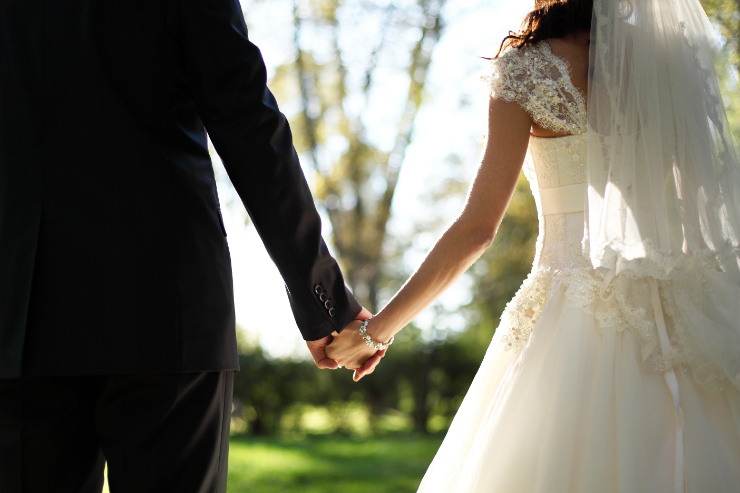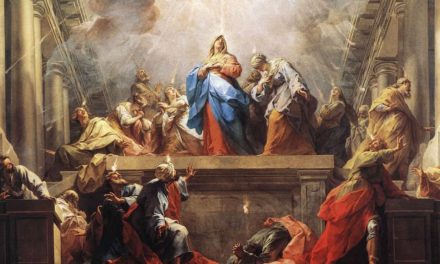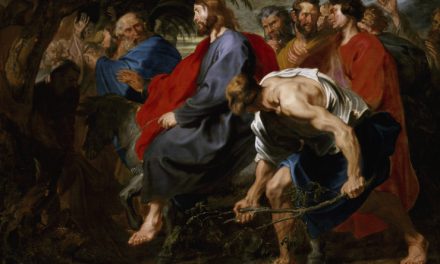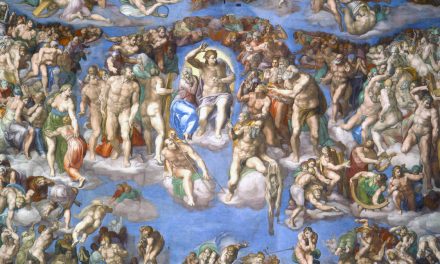
OUR VOCATION
In His infinite love and goodness, God created man and woman in freedom to know, love and serve Him in this life and to spend all eternity with Him in the life to come. This call to holiness and invitation to the end for which we are made is our vocation and dignity as human persons.
“Man is by nature and vocation a religious being. Coming from God, going toward God, man lives a fully human life only if he freely lives by his bond with God.” (CCC ¶ 44)
We are incorporated into this life by Baptism. How we are to live out this call to holiness is what we refer to as the state in life in which we live our vocation. From the moment of our baptism, we are to prayerfully discern the vocational state to which God calls us:
- Married life—a chaste, loving, permanent, and exclusive covenant relationship between one man and one woman, open to new life and entered into freely.
- Religious life—a celibate single state of service to God chosen by a man or woman over the married life, often lived out in a religious community. Religious sisters and brothers are actively engaged in apostolates that involve active work in the world. Religious nuns and monks live out prayerful contemplative lives, often in cloisters.
- Clerical life—men ordained to one or more of the degrees of clergy: episcopate (bishops), presbyterate (priests) and diaconate (deacons). Bishops and priests are ordained to a share in the ministerial priesthood of Jesus Christ; deacons to service. “Let everyone revere the deacons as Jesus Christ, the bishop as the image of the Father, and the presbyters as the senate of God and the assembly of the apostles. For without them one cannot speak of the Church.” (St. Ignatius of Antioch, Letter to the Trallians, ca. A.D. 110)
VOCATION IN RELATION TO OUR WORK
It is likely apparent that the above list excludes the variety of secular work in which one might engage: skilled and unskilled labor, commerce and the professions such as health, medicine, teaching, finance and legal, among others. This is not to imply that such work is unimportant—this work too is sacred; it is the dignity of man and woman to work. Work done well is a cause of our holiness. However, one should not confuse career with religious vocation. Such work is often necessary to support our vocations, but our vocations must never be sacrificed to support our work.
THE SACRAMENTS OF SERVICE
The focus of this article is on the Sacrament of Marriage, one of the two Sacraments of Service (the other being Holy Orders). These two sacraments are referred to as the “Sacraments at the Service of Communion” and are directed to the salvation of others. The Catechism of Catholic Church states:
“…Holy Orders and Matrimony, are directed towards the salvation of others; if they contribute as well to personal salvation, it is through service to others that they do so. They confer a particular mission in the Church and serve to build up the People of God.” (CCC ¶ 1534)
“Holy Orders is the sacrament through which the mission entrusted by Christ to his apostles continues to be exercised in the Church until the end of time: thus it is the sacrament of apostolic ministry. It includes three degrees: episcopate, presbyterate, and diaconate.” (CCC ¶ 1536)
“The matrimonial covenant, by which a man and a woman establish between themselves a partnership of the whole of life, is by its nature ordered toward the good of the spouses and the procreation and education of offspring; this covenant between baptized persons has been raised by Christ the Lord to the dignity of a sacrament.” (CCC ¶ 1601)
When we have discerned, chosen and entered into Marriage or Holy Orders as our vocation, we assume the responsibility of leading others to salvation and their eternal life in heaven in a particular way. As a husband, wife, father or mother, we assume a particular responsibility to lead our spouse and children to heaven, in addition to our own attainment of heaven. A bishop, priest or deacon assumes a particular responsibility for leading those he serves to heaven, in addition to his own attainment of heaven. This is to be accomplished by the grace of God, including a particular grace conferred by the sacrament for that purpose.
RESPONDING TO SECULAR OBJECTIONS AND CULTURAL UPHEAVAL
In recent years, we’ve seen increasing attacks on the vocations of Marriage and Holy Orders by individuals and groups who seek to redefine their meaning. An increasing number of states have legalized so-called marriage equality laws. And then, in June 2015, the U.S. Supreme Court ruled that states could no longer reserve marriage to heterosexual couples. Let’s look at some of the more common objections to the Church’s teaching on these vocations and formulate responses.
Answers to Common Objections to Church Teaching on Marriage
Objection #1 to Marriage: If two people love each other, what is wrong about them simply living together as a committed couple; why should they bother with a marriage ceremony?
Reply to Objection #1:
This objection deserves careful attention. It is not an attempt to redefine marriage as much as it intends to simply dismiss marriage as unnecessary. We often hear other objections more frequently, but this one may be more troubling.
While it is true that the percentage of Americans who are married is in steep decline, this is not universally true in the U.S. For instance, some studies indicate that the incidence of divorce among the more highly educated is declining while the age for a first marriage is increasing for both men and women. However, among the less educated poor, plus a growing number or individuals who can be classified among America’s middle class, many are foregoing marriage altogether and many unmarried women are raising children without the help or presence of the child’s father.
This is problematic for a variety of reasons as found by studies that indicate children raised outside of a married home are more likely to use drugs, get into criminal trouble and not attend or complete college. Adult men and women who are not married and have not specifically chosen the single state as a vocation are more likely to be unhappy, depressed and under-achievers.
So here is the problem. Marriage, as a sacrament of service to communion and the salvation of others, is not at work for those who voluntarily avoid it while simulating some of its behaviors.
- From a religious perspective, men and women who choose to live together in a sexual relationship are not dying to self for the supernatural end of their partner or themselves. Any children who are brought into the world are not raised to know Jesus Christ as their Lord or His Church as their family. Both parents and children are at a disadvantage where it comes to their vocational call to holiness. In sacramental marriage, God conveys the grace needed by the spouses and children in order to thrive.
- From a societal perspective, marriage is critical to the common good of society, so the avoiding of marriage leads to economically and psychologically disadvantaged adults and children who impose burdens on both themselves and the rest of society.
Objection #2 to Marriage: Traditional marriage is defined as between one man and one woman. This is not only unfair, it is bigoted. Don’t people with same-sex attraction have a right to live as a married couple, even when the two spouses are of the same gender? Who are you to impose your religious beliefs on me?
Reply to Objection #2:
Use of adjectives such as “traditional” is often used to imply that those who oppose the redefinition of marriage are conservative bigots who are stuck in the past and who discriminate against those with same-sex attraction.
Most people believe that discrimination against homosexuals is wrong, and I emphatically agree—unjust discrimination against anyone is a sin and should be opposed by a faithful Catholic. Each human being, including one with same-sex attraction, possesses a God-given dignity that is undeniable and must be respected.
But words have meanings and ignoring those meanings has consequences. Marriage is an institution that is intended for the well-being of spouses and the children their union brings forth. Two men cannot enter into a procreative union to have children. Neither can two women. Civil law might permit two people of the same sex to live a life together and adopt children, but that is not marriage… it is something else.
Catholics do not seek to impose our religious beliefs on others; we do ask that others not impose their beliefs on Catholics. The overwhelming experience of men and women across time, place and culture recognizes the Catholic understanding of marriage. This unique relationship between one man and one woman, and the recognition of its status by the state, benefits both the couple and their children, and thus, society and culture; disregard for marriage has the opposite effect. We do seek to defend and protect that status and understanding and to continue to speak out about the sin and harm that comes from unchaste relationships and acts.
Since same-sex unions cannot inherently attain what marriage intends; it is not bigotry to say they are not marriage.
Objection #3 to Marriage: If a marriage fails, one should be able to divorce and remarry. Why would you deny me happiness?
Reply to Objection #3:
Too often, people view marriage as a contract as if it involves the exchange of only goods and services. “As long as you do what I contracted for, I will stay married, but should you fail to live up to our agreement, I will divorce you.” Marriage is much more than a contract, it is a covenant relationship. In a covenant, persons are exchanged… totally!
Looks upon a crucifix and you will see what sacramental marriage images. Each spouse is to lay down his or her life for the other. This is not a 50-50 deal; it is 100-100. True love is not conditional, it is given without condition. The covenant of marriage is an image of the New Covenant… “I love you no matter what… for better or for worse, in sickness and in health, in good times and in bad, ‘till death do us part.” Yes, there may be occasions when one or the other spouse fails to honor the covenant that physical or emotion danger or abuse arises. In such cases it may be necessary to separate and civilly to divorce, but if the marriage was valid, it is not ended and the parties are not free to marry others.
Into the deep…
Deacon Bickerstaff is available to speak at your parish or event. Be sure to check out his Speaker Page to learn more. Into the Deep is a regular feature of the The Integrated Catholic Life™.
Come and Join me on Twitter!















